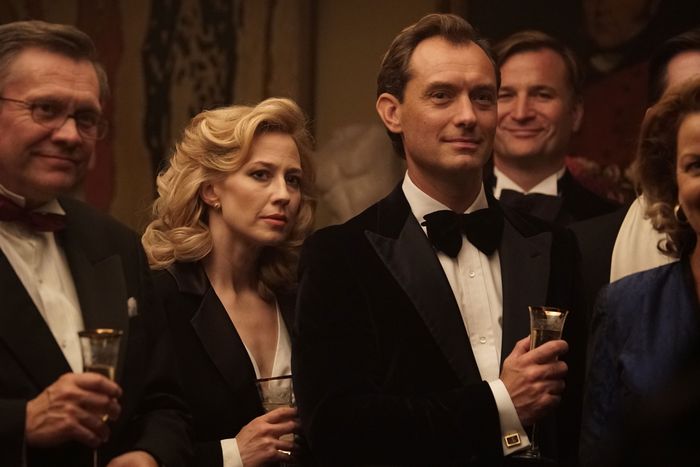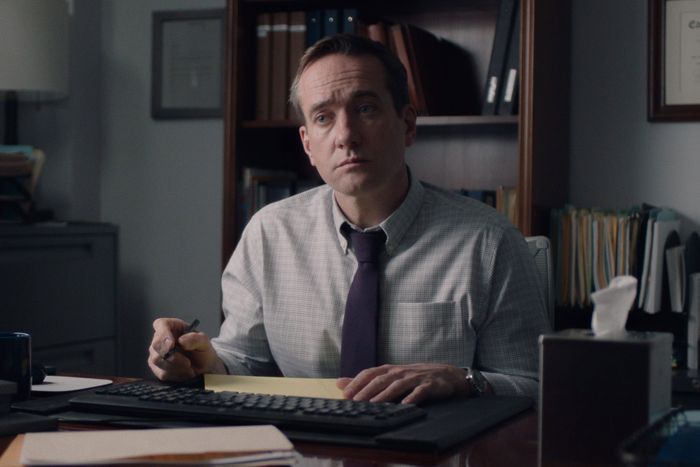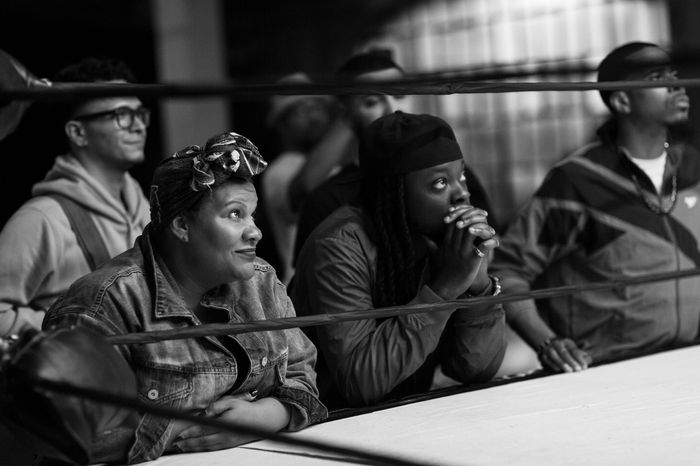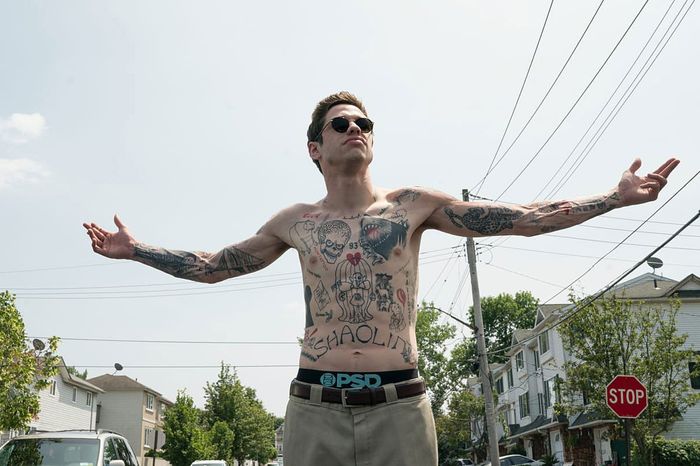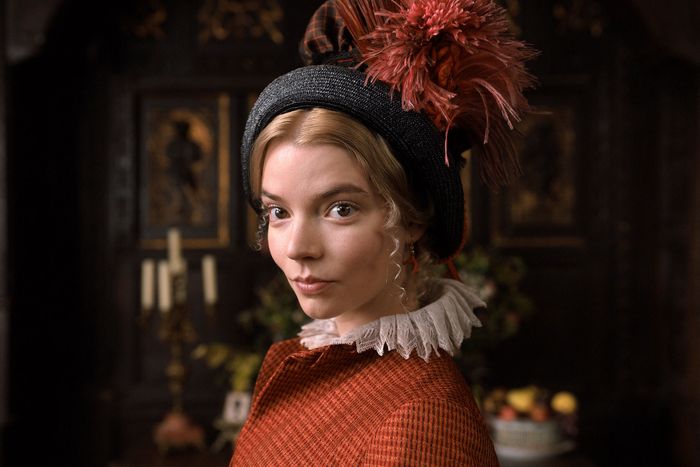
The Oscar voting period runs through this Wednesday, March 10, with nominees getting revealed next Monday, which means all over Hollywood, ballots are still being filled out. The major contenders have been campaigning for months and, as is the case every year, a sprawling field of dozens upon dozens of contenders across the board has been whittled — if only in the public consciousness — down to a small handful of hopefuls in each category. This is the nature of the beast, of course, but it doesn’t have to be this way. Oscar voters! You don’t have to be boxed in by the tyranny of “likely” nominees! Allow us to suggest these far more unlikely, but also decidedly worthy films and performances that deserve some last-minute consideration before you send those ballots out.
The Nest for Best Picture / Carrie Coon for Best Actress
Every year there’s always one glowingly reviewed movie that seems like a no-brainer to show up among the awards-season discussion that for some reason or another just doesn’t. This year, even with a pandemic wreaking havoc on the movie calendar and presenting many smaller films with the chance to play a bigger part in the awards than they otherwise would, the season has managed to leave behind director Sean Durkin’s ’80s-set capitalism terror, The Nest. Unfortunately, this has happened to Durkin before; in 2011, after his Martha Marcy May Marlene debuted at Sundance, the expectations were high that Elizabeth Olsen would travel the awards-season path that Jennifer Lawrence had for Winter’s Bone the year before, but ultimately nothing came of it. And now, once again, Durkin has delivered a family drama that feels haunted by its own central conflict.
Also, what’s it going to take to get Carrie Coon a major nomination somewhere? Singing praises for her every film and TV performance has entered the realm of cliché, but she gave 2020’s best lead-actress performance in The Nest as a woman married to Jude Law and hauled to his cavernous English country home, where she becomes steadily and poisonously disdainful of his phony-capitalist posturing. The fact that Coon isn’t currently swimming in critics’ prizes and precursor awards is puzzling enough, but that she’s not a contender at all for even a Best Actress nomination is worthy of one of her withering onscreen sneers. — Joe Reid
Matthew Macfadyen in The Assistant for Best Supporting Actor
I’ve been bummed for a few months that the awards-season train speeded past Kitty Green’s quiet yet eviscerating movie about a young woman working for an abusive producer. Though it’s based off of Harvey Weinstein, the movie focuses more on all the people who turn like Seiko gears to enable men like him. Green gets the banality of a production office down to chilling details — the power struggles between various junior executives, the carafes of sparkling water they serve at meetings, the endless photocopying — that I wondered if it was simply too real for some in Hollywood to stomach. In an ideal world, Green would be getting recognition for her screenplay and directing (we called it the “first great movie about Me Too”), while Julia Garner would be a Best Actress contender for the way she captures her character’s slow realization of who exactly she’s serving. But if I can throw another name into the group: Matthew Macfadyen sneaks into the movie with a white-toothed glint as the HR manager who swiftly shames and shuts down Garner without breaking a sweat. “You’re not his type,” he tells her at one moment, adding that he knows she commutes from Astoria in a way that unveils all the venom in the class difference he’s really getting at. If we’re looking for last year’s best true supporting performances, not leads going trophy-hunting in a different category, he’s near the top of my list. — Jackson McHenry
La Llorona for Best International Feature
Jayro Bustamante’s Guatemalan ghost story has taken a winding road to its current spot on the International Feature Film shortlist. La Llorona premiered at Venice back in 2019 and was picked up by the horror streaming service Shudder ahead of its U.S. premiere at Sundance, getting an online release last summer. Courtesy of the pandemic, it’s only getting a theatrical release now, in New York City, as cinemas reopen. When Guatemala selected the film as its Oscar submission, the choice wasn’t startling — the country has only made three Academy Award submissions to date, and two of them were directed by Bustamante, a 43-year-old who’s been central to the emerging industry there. What has been a pleasant surprise has been the way that La Llorona’s award prospects have continued to simmer, with the film getting the Best Foreign Language win from the National Board of Review, nabbing a Golden Globe nomination, and racking up all sorts of critics-circle mentions. Horror fare doesn’t often make an appearance at the Oscars, and what’s remarkable about La Llorona is the way that it blends the genre with historical trauma. It’s a stunningly shot tale about a retired general being put on trial for initiating the genocide of indigenous Mayans decades before. As the elderly former dictator holes up in his house with his family, angry crowds gather outside and the staff flees, leaving only a serene, unsettling newcomer named Alma (María Mercedes Coroy). Bustamante’s film brilliantly brings together a figure out of Latin American folklore and an atrocity from the not-so-distant past, exploring his country’s treatment of its native population while crafting a haunted-house story that’s chilling. — Alison Willmore
Dan Stevens in Eurovision Song Contest: The Story of Fire Saga for Best Supporting Actor
Being a comedy villain doesn’t exactly call for a ton of range. Quite the opposite: It’s the kind of role that often requires a performer to go all-in and over-the-top on one particular quality. Great comedy villains like Dr. Evil (Mike Myers) or Bill Lumbergh (Gary Cole) or Jean Girard (Sacha Baron Cohen) or Rudy Giuliani (Rudy Giuliani) are terrific examples of what can be done by hitting one broad, glorious, insistent note over and over again. But every once in a while, we get a performance that somehow does all that while still adding depth. As Alexander Lemtov in Eurovision Song Contest: The Story of Fire Saga, Dan Stevens takes a character who seems at first to be pure shtick — a vain, foofy-haired, grandiose, absurdly wealthy Russian pop singer determined to win the Eurovision Song Contest — and layers him with genuine emotion, giving him an inner life. All the while, he does some of the funniest, whip-crackingest, oversexed dance routines in recent movie memory. (Stevens was also supposed to sing at least part of Lemtov’s unforgettable pop-operatic banger “Lion of Love,” but the pandemic prevented him from being able to record. Of course, that shouldn’t matter to an Academy that recently gave an Oscar to Rami Malek for his portrayal of Freddie Mercury.)
There is actually a very fine line being walked in Eurovision with Lemtov’s character. It’s revealed over the course of the film that he is gay, and thus unable to be out in his homeland. “There’s sort of this sad kind of inner conflict,” Stevens told me when I interviewed him last year. “On the exterior, he’s this wild, bombastic performer, but he’s not actually able to live out his truth.” It would never really have made sense to turn Lemtov into a villainous caricature, to be sure, but the character is fascinating in his own right. We’re transfixed by him the first time we see him. There’s a mystery to this man throughout — a kind of regal grace that Stevens brings, and maybe some melancholy — even amid Lemtov’s wild, explosive dance numbers and his aggressive faux-courtship of Rachel McAdams’s Sigrit Ericksdottir.
There’s also real humanity here. Late in the film, when fellow contestant (and fellow foil) Mita (Melissanthi Mahut) tells him that he deserves to be happy, Lemtov replies, “Mother Russia does not agree.” Stevens gives just the right touch of weary sorrow to these words. Eurovision isn’t a sad movie by any means; it’s a joyous, winning comedy, and, as such, one of the few truly essential films I saw in our abominable pandemic year. But with Dan Stevens’s performance as Alexander Lemtov, it gains uncommon beauty and pathos. — Bilge Ebiri
The 40-Year-Old Version for Best Original Screenplay
There was a moment there where it seemed like Radha Blank’s Sundance prize–winning feature-film debut was going to make a serious push into Oscar season. The 40-Year-Old Version showed up on top ten lists from the National Board of Review and the American Film Institute, giving a glimmer of hope that the higher-profile awards groups might follow suit. Alas, despite this week’s wonderful surprise BAFTA nomination for Blank in Best Actress, it looks like an Oscar nod is a long shot for Blank’s incredibly smart and funny film, which quasi-autobiographically stars herself as a frustrated midlife playwright who finds a spark and a creative verve when she takes her career on a left turn into rapping. It’s exactly the kind of movie you most want to see honored by the screenplay categories: a personal, funny, enthralling work by an exciting new talent whom Oscar would be smart to want to get in with on the ground floor. In a year when Netflix is likely going to end up dominating huge corners of the Oscar ballot, it’ll be a shame if this is their film that gets left off entirely. — Joe Reid
The King of Staten Island for Best Original Screenplay
The most basic writing advice is simple: “Write what you know.” Pete Davidson (the “cilantro of stand-up comedians”) did just that for his breakout lead in The King of Staten Island, starring in the film and co-writing the script along with Judd Apatow and Dave Sirus. There are basic similarities to Davidson’s life — both he and his character, Scott Carlin, live with their mothers in Staten Island and grieve the death of their firefighter fathers. But Davidson, Apatow, and Sirus turn the basic tenets of the SNL star’s life into a story that dives into death with refreshing realism and specificity. Scott nearly kills himself on the opening page, cracking the door for some darkly disarming humor throughout (“Knock, knock / Who’s there? / Not your dad!”). The script builds from there, as Davidson, Apatow, and Sirus put Scott to work at his dad’s old firehouse, mastering the quick cadence of a conversation between old co-workers turned friends.
This would be Apatow’s first Oscar nomination in his wildly successful career. And it would be well-deserved, with a script that shows growth for the filmmaker, blending comedy, honesty, and a coming-of-age narrative with ease. As Alison Willmore points out, the film spends far more time living in Scott’s expository character than letting him develop, thus hurting the women in his life — namely his mother Margie (Marisa Tomei) and his friend with benefits Kelsey (Bel Powley) — in the meantime. But as Scott accompanies Kelsey to her civil-service test in Manhattan, he looks into the bright city sky and, as the screenplay reads, imagines “the possibilities of a future outside of Staten Island for the first time.” There’s nothing more hopeful than that, and hope is something we all could use right about now. — Charlotte Walsh
Jamie Foxx in Soul for Best Actor
I’ve been crying a lot during the past year (I’m fine, I promise), but the only piece of pop culture to pull two separate, deep-chested sobs out of me was Soul, an instant if underseen Pixar classic (a Best Picture front-runner in an alt timeline) that I’m excited to watch again when circumstances aren’t nearly as dire. Jamie Foxx as Joe — the charismatic, burned-out jazz musician who’s turned to teaching to make a living — sold me through and through, giving the sort of warmly empathetic performance Phyllis Smith perfected as Sadness in Inside Out six years ago. Voice acting never gets the same Oscar shine as non-animated performances — we’re still waiting on our first voice performance to be nominated in an acting category — but Foxx’s Joe is deserving of notice this year, equal parts dry, funny, defeated, and hopeful. In just under two hours, the actor deftly balances grief and revelation with equal seriousness; he also, in the great Disney tradition of body-swapping, has to embody a cat named Mr. Mittens. Who else has the range? — Brennan Carley
Emma. for Best Production Design
Had Autumn de Wilde’s Emma. been released this fall rather than last spring, the Jane Austen adaptation would be assured of multiple craft nominations. (Though it also would have made half as much money.) This is a beautiful birthday cake of a movie, packed with sumptuous visual delights, and in those dark early weeks of quarantine, its frizzy version of Regency England was a much-needed escape. The film’s feast of frocks and effervescent hairdos give it a puncher’s chance at Costume Design and Hair & Makeup noms, but I need to speak up for Kave Quinn’s production design, which turns those familiar drawing rooms and grand estates into a cotton-candy dollhouse. Sure, the film’s love of muted pinks and pistachio green may bring to mind the dreaded millennial aesthetic, but de Wilde and Quinn make it their own by swapping out minimalism for a vision of rococo excess that puts the “Austen” in “ostentatious.” No other movies this year were as sheer fun to look at.
Note: I would have also recommended voting for Isobel Waller-Bridge’s sprightly score and the original song “Queen Bee,” by Johnny Flynn (yes, the guy from Scrotal Recall), but for the unfortunate fact that neither made the Oscar shortlist. — Nate Jones


